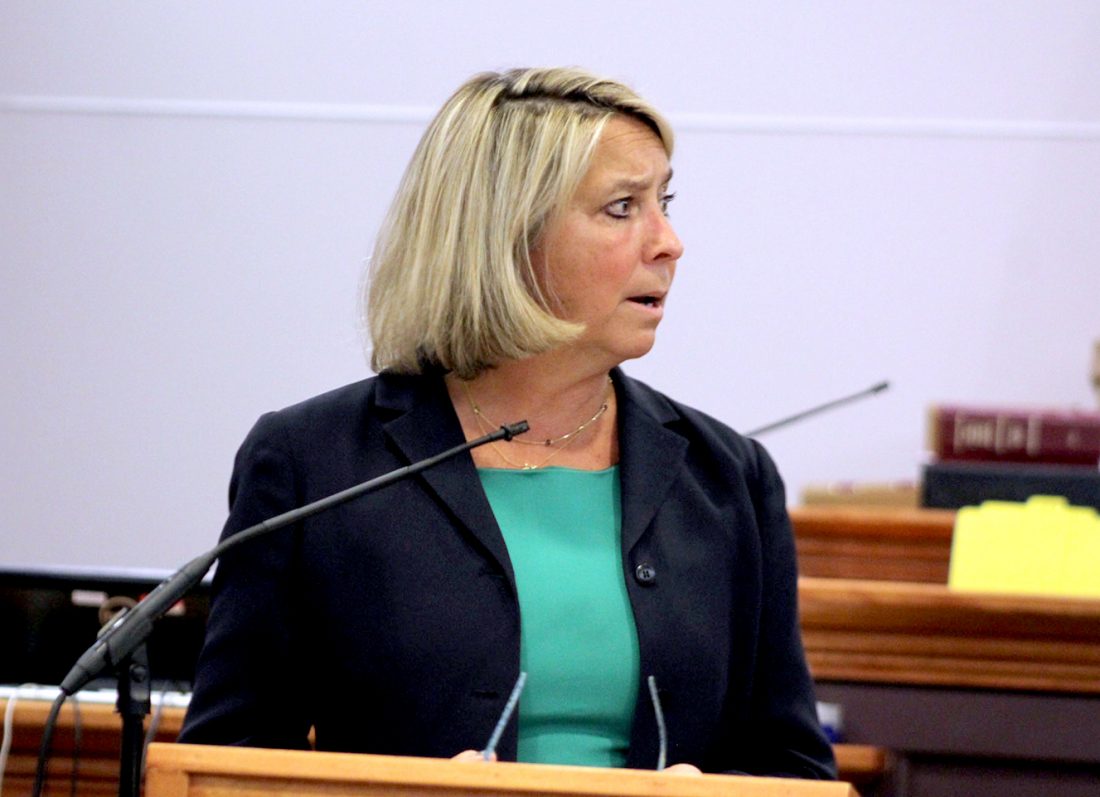By GARRY RAYNO, InDepthNH.org
CONCORD — The state Supreme Court declined to address a superior court judge’s request to determine if the state constitution forbids partisan gerrymandering before deciding a case contesting the new state Senate and Executive Council districts.
Earlier this month Hillsborough County Superior Court South Judge Jacalyn Colburn asked the court to address several questions on redrawing political districts before she scheduled hearings on the case 11 Democratic voters filed against Secretary of State David Scanlan. The suit seeks an injunction to block use of the new districts in upcoming elections this year.
Gov. Chris Sununu signed the two bills establishing the new districts that would give Republicans a potential 16-to-eight advantage in the Senate and a four-to-one majority on the Executive Council.
The Supreme Court did not give a reason for declining the request, but listed a court rule that authorizes them to refuse to hear such requests.
Colburn said in her order earlier this month asking the Supreme Court for guidance, if the court refused to address the issue she would schedule an expedited hearing on the injunction request.
As of 3 p.m. Wednesday, a hearing on the case had not been scheduled.
In their suit Democrats argue the proposed districts violate the free and fair election clause in the state constitution, because the intent is to prevent Democratic voters from fairly and equally participating in the political process.
They also claim the plans violate the constitution’s equal protection guarantee by denying their right to equal weight of their votes compared to Republicans.
And they also believe the redistricting plans violate the constitution’s guarantee of free speech and association, as the plans discriminate and retaliate against Democrats by diluting their ability to band together and elect candidates of their choice.
The plaintiff’s suit claims the redistricted plans serve no state interest, but instead serve Republican Party interests.
“This Court should vindicate the fundamental rights of New Hampshire voters by enjoining future use of the Challenged Plans and ordering the creation and implementation of new Senate and Executive Council plans that comply with the requirements of the New Hampshire Constitution,” the suit says.
Colburn asked the Supreme Court if “any provision of the New Hampshire Constitution prohibits the general court from enacting senate and executive council districts that are drawn in a manner that heavily favors one political party over another?”
And she asked if the court determines there is a prohibition, “are political gerrymandering claims justiciable in New Hampshire state courts?”
And if the court finds both questions to be true “what framework should the Court use to evaluate such claims? In other words, what must a plaintiff alleging unconstitutional political gerrymandering prove in order to be entitled to any relief?” Colburn writes in her order.
The plaintiffs and defendant in the case filed a joint motion objecting to Colburn’s intent to send the questions to the Supreme Court without first ruling on the case and considering a preliminary and permanent injunction.
In their joint motion, they said “the motion for a preliminary injunction presents mostly contested issues of fact not readily susceptible to interlocutory transfer without ruling.”
But Colburn denied the motion and instead asked the Supreme Court for its opinion.
In her order she questions whether the plaintiffs have stated a claim for relief the court could grant, noting the state Supreme Court had ruled that political considerations are “tolerated” in legislative redistricting plans in Burling versus Chandler, and the US Supreme Court — in a divided opinion — ruled claims of political or partisan gerrymandering are not adjudicative under any provision of the US Constitution.
However she notes other states have taken up the issue based on their constitutions.
Both parties indicated in their joint motion objecting to the transfer to the Supreme Court, the court was not likely to make a determination in time for the state’s September primary and therefore the court should decide on the contested facts in the case and make a determination before that election.
A suit challenging the Congressional district maps proposed by Republican lawmakers that Gov. Chris Sununu vetoed was heard before the Supreme Court, although it originated at the same superior court.
The Supreme Court hired a special master to redraw the congressional district lines when lawmakers and Sununu failed to agree on several plans.
The special master moved five small towns from one district to the other to equalize the citizens in the two districts, unlike several plans developed by Republican House members that moved 35 to 40 percent of voters from one district to the others.
The court voted unanimously to approve the special master’s plan.
However, there was no impasse between the governor and the Republican-controlled legislature over the Senate and Executive Council districts and the court will have to decide if the state constitution and statutes would govern the drawing or redrawing of the political boundaries for partisan gain.
The political maps have to be redrawn every 10 years to align with changes in population revealed by the US Census.
Garry Rayno may be reached at garry.rayno@yahoo.com.






